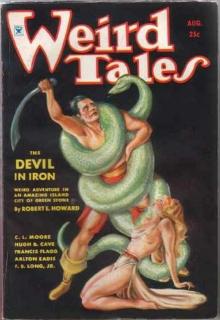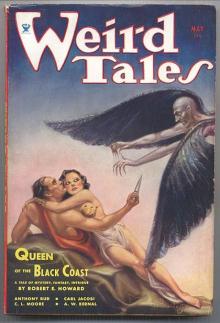- Home
- Robert Ervin Howard
Black Colossus Page 2
Black Colossus Read online
Page 2
"Will Mitra aid me?" Yasmela caught Vateesa's wrist in her eagerness. "We have worshipped Ishtar so long—"
"To be sure he will!" Vateesa was the daughter of an Ophirean priest who had brought his customs with him when he fled from political enemies to Khoraja. "Seek the shrine! I will go with you."
"I will!" Yasmela rose, but objected when Vateesa prepared to dress her. "It is not fitting that I come before the shrine clad in silk. I will go naked, on my knees, as befits a suppliant, lest Mitra deem I lack humility."
"Nonsense!" Vateesa had scant respect for the ways of what she deemed a false cult. "Mitra would have folks stand upright before him — not crawling on their bellies like worms, or spilling blood of animals all over his altars."
Thus objurgated, Yasmela allowed the girl to garb her in the light sleeveless silk shirt, over which was slipped a silken tunic, bound at the waist by a wide velvet girdle. Satin slippers were put upon her slender feet, and a few deft touches of Vateesa's pink fingers arranged her dark wavy tresses. Then the princess followed the girl, who drew aside a heavy gilt-worked tapestry and threw the golden bolt of the door it concealed. This let into a narrow winding corridor, and down this the two girls went swiftly, through another door and into a broad hallway. Here stood a guardsman in crested gilt helmet, silvered cuirass and gold-chased greaves, with a long-shafted battle-ax in his hands.
A motion from Yasmela checked his exclamation and, saluting, he took his stand again beside the doorway, motionless as a brazen image. The girls traversed the hallway, which seemed immense and eery in the light of the cressets along the lofty walls, and went down a stairway where Yasmela shivered at the blots of shadows which hung in the angles of the walls. Three levels down they halted at last in a narrow corridor whose arched ceiling was crusted with jewels, whose floor was set with blocks of crystal, and whose walls were decorated with golden friezework. Down this shining way they stole, holding each other's hands, to a wide portal of gilt.
Vateesa thrust open the door, revealing a shrine long forgotten except by a faithful few, and royal visitors to Khoraja's court, mainly for whose benefit the fane was maintained. Yasmela had never entered it before, though she was born in the palace. Plain and unadorned in comparison to the lavish display of Ishtar's shrines, there was about it a simplicity of dignity and beauty characteristic of the Mitran religion.
The ceiling was lofty, but it was not domed, and was of plain white marble, as were the walls and floor, the former with a narrow gold frieze running about them. Behind an altar of clear green jade, unstained with sacrifice, stood the pedestal whereon sat the material manifestation of the deity. Yasmela looked in awe at the sweep of the magnificent shoulders, the clear-cut features — the wide straight eyes, the patriarchal beard, the thick curls of the hair, confined by a simple band about the temples. This, though she did not know it, was art in its highest form the free, uncramped artistic expression of a highly esthetic race, unhampered by conventional symbolism.
She fell on her knees and thence prostrate, regardless of Vateesa's admonition, and Vateesa, to be on the safe side, followed her example; for after all, she was only a girl, and it was very awesome in Mitra's shrine. But even so she could not refrain from whispering in Yasmela's ear.
"This is but the emblem of the god. None pretends to know what Mitra looks like. This but represents him in idealized human form, as near perfection as the human mind can conceive. He does not inhabit this cold stone, as your priests tell you Ishtar does. He is everywhere — above us, and about us, and he dreams betimes in the high places among the stars. But here his being focusses. Therefore call upon him."
"What shall I say?" whispered Yasmela in stammering terror.
"Before you can speak, Mitra knows the contents of your mind—" began Vateesa. Then both girls started violently as a voice began in the air above them. The deep, calm, bell-like tones emanated no more from the image than from anywhere else in the chamber. Again Yasmela trembled before a bodiless voice speaking to her, but this time it was not from horror or repulsion.
"Speak not, my daughter, for I know your need," came the intonations like deep musical waves beating rhythmically along a golden beach. "In one manner may you save your kingdom, and saving it, save all the world from the fangs of the serpent which has crawled up out of the darkness of the ages. Go forth upon the streets alone, and place your kingdom in the hands of the first man you meet there."
The unechoing tones ceased, and the girls stared at each other. Then, rising, they stole forth, nor did they speak until they stood once more in Yasmela's chamber. The princess stared out of the gold-barred windows. The moon had set. It was long past midnight. Sounds of revelry had died away in the gardens and on the roofs of the city. Khoraja slumbered beneath the stars, which seemed to be reflected in the cressets that twinkled among the gardens and along the streets and on the flat roofs of houses where folk slept.
"What will you do?" whispered Vateesa, all a-tremble.
"Give me my cloak," answered Yasmela, setting her teeth.
"But alone, in the streets, at this hour!" expostulated Vateesa.
"Mitra has spoken," replied the princess. "It might have been the voice of the god, or a trick of a priest. No matter. I will go!"
Wrapping a voluminous silken cloak about her lithe figure and donning a velvet cap from which depended a filmy veil, she passed hurriedly through the corridors and approached a bronze door where a dozen spearmen gaped at her as she passed through. This was in a wing of the palace which let directly onto the street; on all other sides it was surrounded by broad gardens, bordered by a high wall. She emerged into the street, lighted by cressets placed at regular intervals.
She hesitated; then, before her resolution could falter, she closed the door behind her. A slight shudder shook her as she glanced up and down the street, which lay silent and bare. This daughter of aristocrats had never before ventured unattended outside her ancestral palace. Then, steeling herself, she went swiftly up the street. Her satin-slippered feet fell lightly on the pave, but their soft sound brought her heart into her throat. She imagined their fall echoing thunderously through the cavernous city, rousing ragged rat-eyed figures in hidden lairs among the sewers. Every shadow seemed to hide a lurking assassin, every blank doorway to mask the slinking hounds of darkness.
Then she started violently. Ahead of her a figure appeared on the eery street. She drew quickly into a clump of shadows, which now seemed like a haven of refuge, her pulse pounding. The approaching figure went not furtively, like a thief, or timidly, like a fearful traveller. He strode down the nighted street as one who has no need or desire to walk softly. An unconscious swagger was in his stride, and his footfalls resounded on the pave. As he passed near a cresset she saw him plainly — a tall man, in the chain-mail hauberk of a mercenary. She braced herself, then darted from the shadow, holding her cloak close about her.
"Sa-ha!" his sword flashed half out of his sheath. It halted when he saw it was only a woman that stood before him, but his quick glance went over her head, seeking the shadows for possible confederates.
He stood facing her, his hand on the long hilt that jutted forward from beneath the scarlet cloak which flowed carelessly from his mailed shoulders. The torchlight glinted dully on the polished blue steel of his greaves and basinet. A more baleful fire glittered bluely in his eyes. At first glance she saw he was no Kothian; when he spoke she knew he was no Hyborian. He was clad like a captain of the mercenaries, and in that desperate command there were men of many lands, barbarians as well as civilized foreigners. There was a wolfishness about this warrior that marked the barbarian. The eyes of no civilized man, however wild or criminal, ever blazed with such a fire. Wine scented his breath, but he neither staggered nor stammered.
"Have they shut you into the street?" he asked in barbarous Kothic, reaching for her. His fingers closed lightly about her rounded wrist, but she felt that he could splinter its bones without effort. "I've but come from the last wine-s
hop open. Ishtar's curse on these white-livered reformers who close the grog-houses! 'Let men sleep rather than guzzle,' they say — aye, so they can work and fight better for their masters! Soft-gutted eunuchs, I call them. When I served with the mercenaries of Corinthia we swilled and wenched all night and fought all day — aye, blood ran down the channels of our swords. But what of you, my girl? Take off that cursed mask—"
She avoided his clutch with a lithe twist of her body, trying not to appear to repulse him. She realized her danger, alone with a drunken barbarian. If she revealed her identity, he might laugh at her, or take himself off. She was not sure he would not cut her throat. Barbaric men did strange inexplicable things. She fought a rising fear.
"Not here," she laughed. "Come with me—"
"Where?" His wild blood was up, but he was wary as a wolf. "Are you taking me to some den of robbers?"
"No, no, I swear it!" She was hard put to avoid the hand which was again fumbling at her veil.
"Devil bite you, hussy!" he growled disgustedly. "You're as bad as a Hyrkanian woman, with your damnable veil. Here — let me look at your figure, anyway."
Before she could prevent it, he wrenched the cloak from her, and she heard his breath hiss between his teeth. He stood holding the cloak, eyeing her as if the sight of her rich garments had somewhat sobered him. She saw suspicion flicker sullenly in his eyes.
"Who the devil are you?" he muttered. "You're no street-waif — unless your leman robbed the king's seraglio for your clothes."
"Never mind." She dared to lay her white hand on his massive iron-clad arm. "Come with me off the street."
He hesitated, then shrugged his mighty shoulders. She saw that he half believed her to be some noble lady, who, weary of polite lovers, was taking this means of amusing herself. He allowed her to don the cloak again, and followed her. From the corner of her eye she watched him as they went down the street together. His mail could not conceal his hard lines of tigerish strength. Everything about him was tigerish, elemental, untamed. He was alien as the jungle to her in his difference from the debonair courtiers to whom she was accustomed. She feared him, told herself she loathed his raw brute strength and unashamed barbarism, yet something breathless and perilous inside her leaned toward him; the hidden primitive chord that lurks in every woman's soul was sounded and responded. She had felt his hardened hand on her arm, and something deep in her tingled to the memory of that contact. Many men had knelt before Yasmela. Here was one she felt had never knelt before any one. Her sensations were those of one leading an unchained tiger; she was frightened, and fascinated by her fright.
She halted at the palace door and thrust lightly against it. Furtively watching her companion, she saw no suspicion in his eyes.
"Palace, eh?" he rumbled. "So you're a maid-in-waiting?"
She found herself wondering, with a strange jealousy, if any of her maids had ever led this war-eagle into her palace. The guards made no sign as she led him between them, but he eyed them as a fierce dog might eye a strange pack. She led him through a curtained doorway into an inner chamber, where he stood, naively scanning the tapestries, until he saw a crystal jar of wine on an ebony table. This he took up with a gratified sigh, tilting it toward his lips. Vateesa ran from an inner room, crying breathlessly, "Oh my princess—"
"Princess!"
The wine-jar crashed to the floor. With a motion too quick for sight to follow, the mercenary snatched off Yasmela's veil, glaring. He recoiled with a curse, his sword leaping into his hand with a broad shimmer of blue steel. His eyes blazed like a trapped tiger's. The air was supercharged with tension that was like the pause before the bursting of a storm. Vateesa sank to the floor, speechless with terror, but Yasmela faced the infuriated barbarian without flinching. She realized her very life hung in the balance: maddened with suspicion and unreasoning panic, he was ready to deal death at the slightest provocation. But she experienced a certain breathless exhilaration in the crisis.
"Do not be afraid," she said. "I am Yasmela, but there is no reason to fear me."
"Why did you lead me here?" he snarled, his blazing eyes darting all about the chamber. "What manner of trap is this?"
"There is no trickery," she answered. "I brought you here because you can aid me. I called on the gods — on Mitra — and he bade me go into the streets and ask aid of the first man I met."
This was something he could understand. The barbarians had their oracles. He lowered his sword, though he did not sheathe it.
"Well, if you're Yasmela, you need aid," he grunted. "Your kingdom's in a devil of a mess. But how can I aid you? If you want a throat cut, of course—"
"Sit down," she requested. "Vateesa, bring him wine."
He complied, taking care, she noticed, to sit with his back against a solid wall, where he could watch the whole chamber. He laid his naked sword across his mail-sheathed knees. She glanced at it in fascination. Its dull blue glimmer seemed to reflect tales of bloodshed and rapine; she doubted her ability to lift it, yet she knew that the mercenary could wield it with one hand as lightly as she could wield a riding-whip. She noted the breadth and power of his hands; they were not the stubby undeveloped paws of a troglodyte. With a guilty start she found herself imagining those strong fingers locked in her dark hair.
He seemed reassured when she deposited herself on a satin divan opposite him. He lifted off his basinet and laid it on the table, and drew back his coif, letting the mail folds fall upon his massive shoulders. She saw more fully now his unlikeness to the Hyborian races. In his dark, scarred face there was a suggestion of moodiness; and without being marked by depravity, or definitely evil, there was more than a suggestion of the sinister about his features, set off by his smoldering blue eyes. A low broad forehead was topped by a square-cut tousled mane as black as a raven's wing.
"Who are you?" she asked abruptly.
"Conan, a captain of the mercenary spearmen," he answered, emptying the wine-cup at a gulp and holding it out for more. "I was born in Cimmeria."
The name meant little to her. She only knew vaguely that it was a wild grim hill-country which lay far to the north, beyond the last outposts of the Hyborian nations, and was peopled by a fierce moody race. She had never before seen one of them.
Resting her chin on her hands, she gazed at him with the deep dark eyes that had enslaved many a heart.
"Conan of Cimmeria," she said, "you said I needed aid. Why?"
"Well," he answered, "any man can see that. Here is the king your brother in an Ophirean prison; here is Koth plotting to enslave you; here is this sorcerer screaming hell-fire and destruction down in Shem — and what's worse, here are your soldiers deserting every day."
She did not at once reply; it was a new experience for a man to speak so forthrightly to her, his words not couched in courtier phrases.
"Why are my soldiers deserting, Conan?" she asked.
"Some are being hired away by Koth," he replied, pulling at the wine-jar with relish. "Many think Khoraja is doomed as an independent state. Many are frightened by tales of this dog Natohk."
"Will the mercenaries stand?" she asked anxiously.
"As long as you pay us well," he answered frankly. "Your politics are nothing to us. You can trust Amalric, our general, but the rest of us are only common men who love loot. If you pay the ransom Ophir asks, men say you'll be unable to pay us. In that case we might go over to the king of Koth, though that cursed miser is no friend of mine. Or we might loot this city. In a civil war the plunder is always plentiful."
"Why would you not go over to Natohk?" she inquired.
"What could he pay us?" he snorted. "With fat-bellied brass idols he looted from the Shemite cities? As long as you're fighting Natohk, you may trust us."
"Would your comrades follow you?" she asked abruptly.
"What do you mean?"
"I mean," she answered deliberately, "that I am going to make you commander of the armies of Khoraja!"
He stopped short, the goble
t at his lips, which curved in a broad grin. His eyes blazed with a new light.
"Commander? Crom! But what will your perfumed nobles say?"
"They will obey me!" She clasped her hands to summon a slave, who entered, bowing deeply. "Have Count Thespides come to me at once, and the chancellor Taurus, lord Amalric, and the Agha Shupras.
"I place my trust in Mitra," she said, bending her gaze on Conan, who was now devouring the food placed before him by the trembling Vateesa. "You have seen much war?"
"I was born in the midst of a battle," he answered, tearing a chunk of meat from a huge joint with his strong teeth. "The first sound my ears heard was the clang of swords and the yells of the slaying. I have fought in blood-feuds, tribal wars, and imperial campaigns."
"But can you lead men and arrange battle-lines?"
"Well, I can try," he returned imperturbably. "It's no more than sword-play on a larger scale. You draw his guard, then stab, slash! And either his head is off, or yours."
The slave entered again, announcing the arrival of the men sent for, and Yasmela went into the outer chamber, drawing the velvet curtains behind her. The nobles bent the knee, in evident surprize at her summons at such an hour.
"I have summoned you to tell you of my decision," said Yasmela. "The kingdom is in peril—"
"Right enough, my princess." It was Count Thespides who spoke — a tall man, whose black locks were curled and scented. With one white hand he smoothed his pointed mustache, and with the other he held a velvet chaperon with a scarlet feather fastened by a golden clasp. His pointed shoes were satin, his cote-hardie of gold-broidered velvet. His manner was slightly affected, but the thews under his silks were steely. "It were well to offer Ophir more gold for your royal brother's release."

 Shadows in Zamboula (conan the barbarian)
Shadows in Zamboula (conan the barbarian) Shadows in the Moonlight (conan the barbarian)
Shadows in the Moonlight (conan the barbarian) The People of the Black Circle (conan the barbarian)
The People of the Black Circle (conan the barbarian) Almuric
Almuric Xuthal of the Dusk (conan the barbarian)
Xuthal of the Dusk (conan the barbarian) The Devil in Iron (conan the barbarian)
The Devil in Iron (conan the barbarian) Beyond the Black River (conan the warrior)
Beyond the Black River (conan the warrior) The Phoenix on the Sword (conan the barbarian)
The Phoenix on the Sword (conan the barbarian) Queen of the Black Coast
Queen of the Black Coast The Tower of the Elephant (conan the barbarian)
The Tower of the Elephant (conan the barbarian) Black Colossus
Black Colossus The Hour of the Dragon (conan the barbarian)
The Hour of the Dragon (conan the barbarian) Jewels of Gwahlur (conan the warrior)
Jewels of Gwahlur (conan the warrior) Gods of the North (conan the barbarian)
Gods of the North (conan the barbarian) The Pool of the Black One (conan the barbarian)
The Pool of the Black One (conan the barbarian) A Witch Shall Be Born
A Witch Shall Be Born Red Nails (conan the warrior)
Red Nails (conan the warrior)